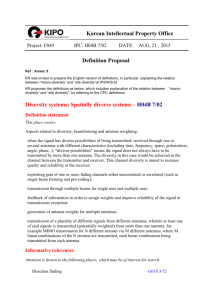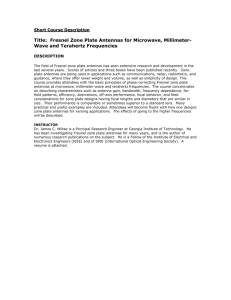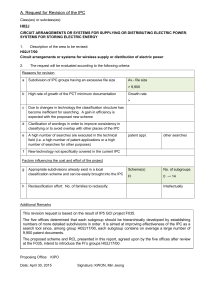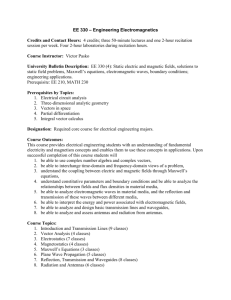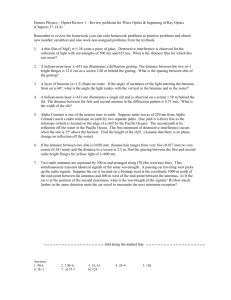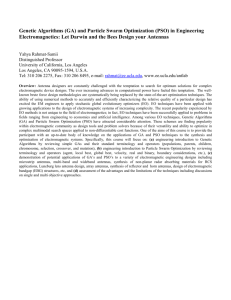DEUTSCHES PATENTAMT
advertisement
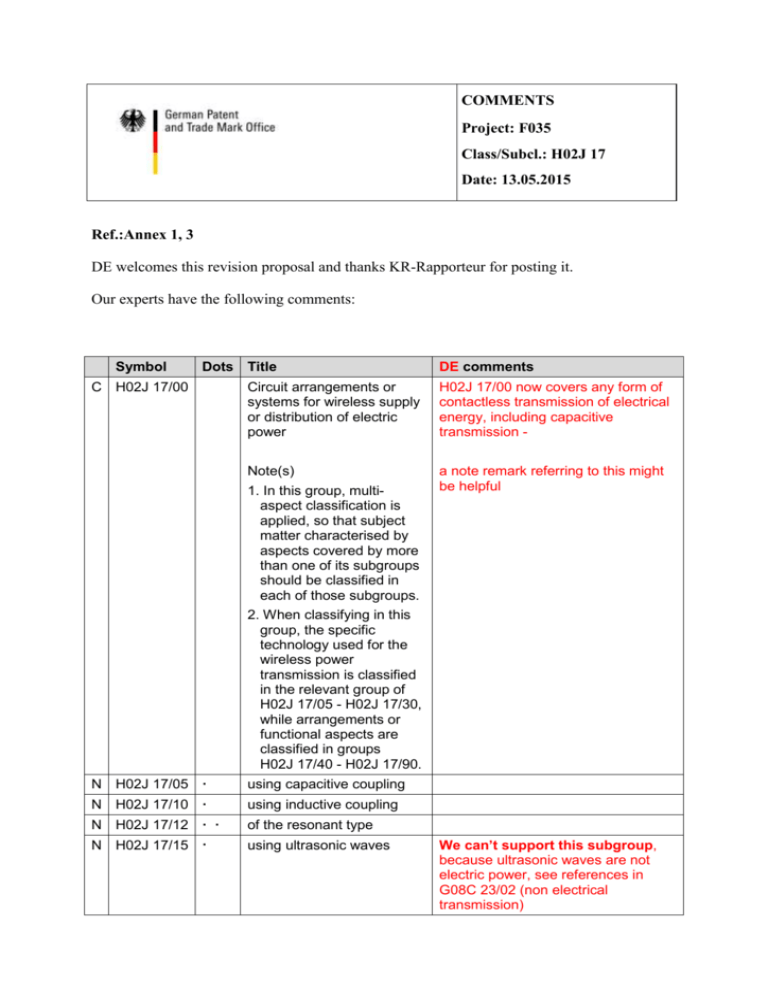
COMMENTS Project: F035 Class/Subcl.: H02J 17 Date: 13.05.2015 Ref.:Annex 1, 3 DE welcomes this revision proposal and thanks KR-Rapporteur for posting it. Our experts have the following comments: Symbol Dots Title C H02J 17/00 DE comments Circuit arrangements or systems for wireless supply or distribution of electric power H02J 17/00 now covers any form of contactless transmission of electrical energy, including capacitive transmission - Note(s) a note remark referring to this might be helpful 1. In this group, multiaspect classification is applied, so that subject matter characterised by aspects covered by more than one of its subgroups should be classified in each of those subgroups. 2. When classifying in this group, the specific technology used for the wireless power transmission is classified in the relevant group of H02J 17/05 - H02J 17/30, while arrangements or functional aspects are classified in groups H02J 17/40 - H02J 17/90. N H02J 17/05 · using capacitive coupling N H02J 17/10 · using inductive coupling N H02J 17/12 · · of the resonant type N H02J 17/15 · using ultrasonic waves We can’t support this subgroup, because ultrasonic waves are not electric power, see references in G08C 23/02 (non electrical transmission) Symbol Dots Title DE comments N H02J 17/20 · using microwaves or radio frequency "using microwaves or radio frequency waves" N H02J 17/23 · · characterised by the arrangement of the transmitting antennas, e.g. directional array antennas or Yagi antennas We can’t support this subgroup, because specific embodiments of the transmitting antennas include not only classical Yagi antennas but also coils or inductors or laser diodes, other light transmitters or capacitive transmitters. If the application is focused on the design of the transmitter, a classification into the appropriate IPC for the transmitters is meaningful, for example, antennas into H01Q coils/inductors to H01F, capacity into H01G, laser diodes into H01S or other light emitter/transceiver into H04B N H02J 17/27 · · characterised by the arrangement of the receiving antennas, e.g. rectennas We can’t support this subgroup, because specific embodiments of the receiving antennas include not only classical Yagi antennas but also coils or inductors, light receivers or capacitive receivers. If the application is focused on the design of the receiving element, a classification into the appropriate IPC for the receiving element is meaningful, for example, antennas into H01Q coils/inductors into H01F, capacity into H01G, light receivers/transceivers into H04B N H02J 17/30 · using light, e.g. lasers N H02J 17/40 · involving two or more transmitting or receiving devices (H02J 17/50 takes precedence) N H02J 17/50 · using additional energy repeaters between transmitting devices and receiving devices the scope demarcation to H04B 10/.. and G08C 23/04, regarding the transmitting of light, should be considered. Symbol Dots Title N H02J 17/60 · responsive to the presence of foreign objects, e.g. detection of foreign objects DE comments We can’t support this subgroup, because object detection is a completely different technology as the supply and distribution of electric power. If the application is focused on the development of the foreign body detection, a classification into the appropriate IPC for detection methods is meaningful, for example, electric or magnetic detection/tracking into G01V 3/.. or optical detection into G01V 8/.. or image /pattern recognition into G06K 9/.. or to camera systems or to evaluation of temperature changes N H02J 17/70 · involving the reduction of leakage electric, magnetic or electromagnetic fields We can’t support this subgroup, because it relates to the configuration of the respective transmission element to improve the management of the field, e.g. Cores/magnetic shields in transmitting/receiving coils/antennas; see H01F 27/ and also the remarks on H02J 17/23 N H02J 17/80 · involving the exchange of data concerning supply or distribution of electric power We can’t support this subgroup and data exchange aspects shouldn’t be classified into H02J 17/, since data transfer methods (modulation / demodulation) are covered by other relevant IPC groups Symbol Dots Title N H02J 17/90 · involving position detection, alignment or optimisation DE comments In our opinion, this group should cover subject matter regarding the adjustment, balancing or alignment of the resonance of the coils to compensate their misalignment and to increase the energy transfer. This group should not cover the position detection or the movement of the coils to each other; H02J 7/.. covers for instance the movement of the primary coil. Therefore we suggest to change the wording of the group title, which could be somewhat like: “involving resonance alignment or optimization without changing the position or moving the coils” When the application is focused, for example, on the positioning of vehicles for contactless energy transfer, then it should not be part of H02J 17/00, it should be classified according to G05D.
